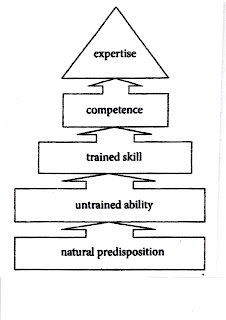 |
| Boguslawa Whyatt |
In a post last October I lamented that "my mission of recognition for the importance of Natural Translation is not yet accomplished and it won't be in the short working life left to me," Then I added, "Hopefully it will be taken up by another generation."
Well, that next generation may already be among us in the person of Prof, Boguslawa Whyatt, head of the Department of Psycholinguistic Stuies at the Adam Mickiewicz University in Poznan, Poland. The title of her paper in the NPIT collection (see References below) says it loud and clear: We are all translators. A title after my own heart! Here's an abstract, in her own words, of the book on which the article is based.
"The book explores translation as a human skill in its evolutionary perspective from the predisposition to translate to translation expertise. By assuming that the human mind is intrinsically a translating mind all people who know two languages are able to translate but only some develop their natural ability into a more refined skill, fewer choose to acquire translation competence, and few attain the level of expertise. Starting with a thorough analysis of the bilingual foundations on which translation as a human skill is built the natural ability is analyzed and followed by an up-to-date account of translation as a trained skill with the underlying translation competence. To account for the developmental nature of translation as a skill a suggestion is made that the acquisition of translation expertise can be seen as a process of learning to integrate knowledge for the purpose of translating."
Why do I like this so much? First because it starts from the perspective that there is a "predisposition to translate… assuming the human mind is intrinsically a translating mind [and] all people who know two languages are able to translate." It's the basis of the Natural Translation Hypothesis, and before me it was affirmed by the Bulgarian semiotician Alexander Ludskanov, who was perhaps the first to declare, "All bilinguals can translate." Whyatt does not discuss whether the predisposition is in some way inherited, but she does reference my paperTranslating as an innate skill.
Second, she views the sophisticated skills of expert translators as the outcome of a progression of learning and experience beyond the initial predisposition. Here's her diagram of the process.
This can be compared with the diagram I posted on this blog in 2010; to retrieve it, enter bandies in the Search box on the right. Her diagram does not show a division between the path of formal training and accreditation and that of self-learning by observation and experience. However, she does so in her text. But it's misleading to say about the latter route, as she does, that "it might apply only to some limited communicative contexts or some talented individuals." This category of what I call (following Toury) Native Translators includes. for example, the large and influential tribe of literary translators, few of whom have ever followed a formal course or training in translating. Indeed, even in Whyatt's own data, among the professional (and presumably expert) translators whom she surveyed, only 57.5% attributed their expertise to a "translation training programme" or to "mentoring."
And third, she recognises that translating expertise requires extralinguistic knowledge and cognitive development as well as language proficiency.
In the 40 years since publication of The Importance of Natural Translation, despite what Whyatt describes as "the criticism from translation scholars" with which it was received, a fair amount has been said to support it, and all the more with the emergence of such phenomena as child language brokering and crowdsourcing. Whyatt's article gives a well-written roundup of the research. All serious translatology specialists should read it.
References
Boguslawa Whyatt. We are all translators: investigating the human ability to translate from a developmental perspective. In R. Antonini et al. (eds.) Non-professional Interpreting and Translation, Amsterdam. Benjamins, 2017, pp. 45-64. For the book, click [here].
Boguslawa Whyatt. Translation As A Human Skill: from predisposition to expertise. Poznan: Wydawnistwo Naukowe (Adam Mickiewicz University.Presss), 2012. 447 p., bibliography. Hard to find in libraries but can be ordered from the publisher at http://www.press.amu.edu.pl/.
If you want to follow Prof. Whyatt`s research, see her pages on the ResearchGate and the Academia.edu websites.
Alexander Konstantinov Ludskanov (or Ljudskanov). Prevezhdat chovekat i machinata [Human and Machine Translation], In Bulgarian. Sofia: Nauka i Izkustvo, 1967. There are German, French and Italian translations: see WorldCat..
Brian Harris. The importance of natural translation. 1976. Click [[here].
Brian Harris and Bianca Sherwood. Translating as an innate skill. 1978. Click [here].

